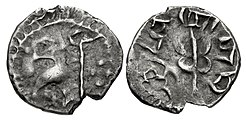Brahmin dynasty of Sindh
 From Wikipedia - Reading time: 8 min
From Wikipedia - Reading time: 8 min
Brahmin dynasty | |||||||||
|---|---|---|---|---|---|---|---|---|---|
| 634–712 | |||||||||
| Capital | Aror | ||||||||
| Common languages | Sanskrit, Sindhi | ||||||||
| Religion | Hinduism | ||||||||
| Government | Monarchy | ||||||||
| Maharaja | |||||||||
• 632–671 | Chach | ||||||||
• 671–679 | Chandar | ||||||||
• 695–712 | Dahir | ||||||||
| History | |||||||||
• Chach founds the dynasty | 632 634 | ||||||||
• Annexed by the Umayyad Caliphate | 724 712 | ||||||||
| |||||||||
| Today part of | Pakistan India Iran | ||||||||

The Brahmin dynasty (c. 632–712),[2] also known as the Chacha dynasty[3] or Silaij dynasty,[4] was a Hindu[5] dynasty that ruled the Sindh region, succeeding the Rai dynasty. Most of the information about its existence comes from the Chach Nama, a historical account of the Chach-Brahmin dynasty.[6]
The members of the dynasty continued to administer parts of Sindh under the Umayyad Caliphate's Caliphal province of Sind after it fell in 712.[2] These rulers include Hullishāh and Shishah.[2]
History
[edit]The dynasty was founded by a Brahmin named Chach of Aror after he married the widow of Rai Sahasi II and usurped the Buddhist Rai dynasty. His claim was further secured by the killing of Rai Sahasi II's brother.[2][7]
The casus belli for the Ummayad invasion was Sindhi pirates seizing tribute sent from the king of Serendib to the Ummayad Caliph. For the campaign Caliph Abd al-Malik ibn Marwan granted a large army to the governor Al-Hajjaj ibn Yusuf, but no attempt was made to annex Sindh due to the caliph's death. Under his son and successor Al-Walid I, the general Muhammad bin Qasim led Islamic invasion of Sindh in 712.
During the conflict local Buddhist clans who maintained loyalty to the previous Rai dynasty such as the Jats, allied themselves with the Ummayads against Dahir. The last Hindu king of Sindh Raja Dahir was killed during the battle of Aror and Sindh was annexed into the Ummayad Caliphate.[8]
Rulers
[edit]The known rulers of the Brahmin dynasty are:[2]
- Dahirsiya (r. c. 679 – c. 709– from Brahmanabad)
Under the Umayyad Caliphate:
- Hullishāh (r. c. 712 – c. 724– )
- Shishah (r. 724– )
-
Sindh. Chach of Alor. Pracandendra. Circa 632-671 CE. AR Damma (11mm, 0.64 g, 2h). Obverse: Crowned head right; swastika to right. Reverse: Large trident
-
Sindh. Multan. ‘Śri Tapana’. Circa 675-700 CE. AR Damma (12mm, 0.62 g, 8h) Head right; śri in Brahmi on forehead Stylized fire altar surmounted by three pellets; tapan and rja in Brahmi around
External links
[edit]See also
[edit]References
[edit]- ^ Schwartzberg, Joseph E. (1978). A Historical Atlas of South Asia. Chicago: University of Chicago Press. p. 146, map XIV.2 (b). ISBN 0226742210.
- ^ a b c d e Wink, André (1991). Al- Hind: The Slave Kings and the Islamic Conquest. Brill. pp. 152–153. ISBN 9004095098.
- ^ Rao, B. S. L. Hanumantha; Rao, K. Basaveswara (1958). Indian History and Culture. Commercial Literature Company. p. 337.
- ^ MacLean, Derryl N. (19 July 2021). Fleet, Kate; Krämer, Gudrun; Matringe, Denis; Nawas, John; Stewart, Devin J. (eds.). "Arūr". Encyclopaedia of Islam Three Online. Brill academic. doi:10.1163/1573-3912_ei3_com_23005. ISSN 1573-3912.
- ^ Shaikh, Muhammad Ali. "History of Sindh, before the arabs arrived". asianews.network. Retrieved 2024-08-30.
- ^ Keay, John (1999). India: A History. London: HarperCollins. pp. 182–183. ISBN 978-0-00-255717-7.
- ^ MacLean, Derryl N. (1989). Religion and Society in Arab Sind. Brill. ISBN 9004085513.
- ^ Burton, Richard (1851). Sindh and the Races that Inhabit the Valley of the Indus. Asian Educational Services. pp. 14–15. ISBN 9788120607583.
 KSF
KSF

